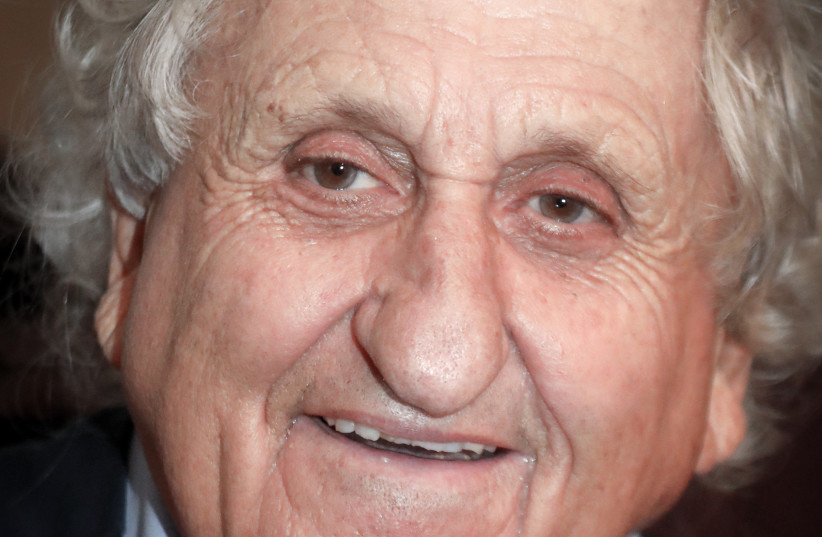“You’re right, sir, for on the face of it Jerusalem is for the Jews what London is for the British,” says British Lieutenant Ivor Horowitz in Mr. Mani, widely seen as the greatest work by novelist A.B. Yehoshua, who died this week at 85.
Horowitz, a British military attorney out to undo the death verdict of convicted spy Yosef Mani, then explains to Col. Michael Woodhouse what Jerusalem – where the two officers emerge along with the victorious British army – means for the Jews.
“In London’s East End you will find more Jews than in this entire country, but that is only because the Englishman doesn’t know how to carry London in his heart, for it is too heavy… but the Jew knows how to carry Jerusalem in his heart and roam the world, and the more Jerusalem’s carriers grow in number, so Jerusalem becomes lighter in weight.”*
It was, in a nutshell, what Yehoshua’s career was all about: some 30 novels, novellas, plays, essay collections and also two children’s books that blended literary imagination and historical curiosity with national soul-searching, Zionist zeal, and quest for peace.
In Mr. Mani (1992) Yehoshua penned an excavating dynamic built on five monologues, each unveiling a different Mani while retreating in time from a southern kibbutz in 1982 through a Greek island under Nazi occupation in 1942 to a rabbi’s deathbed in 1848 Athens.

Obsessed all his life with the Jewish people, the Jewish state, and the two’s place in the Middle East, Yehoshua imagined in that work a Jew’s attempt in 1918 to convince Palestinian villagers to demand their own Balfour Declaration. Had partition happened that way, as a grassroots joint venture, “a Jewish state would have been established before the Holocaust and we could have saved at least a million Jews,” Yehoshua told Haaretz last fall.
The “we” in that statement was part of Yehoshua’s personality, discourse and work, all of which were unapologetically national. This doesn’t mean he was impersonal; on the contrary.
IRONICALLY NICKNAMED, “Buli,” Yehoshua was as affable, humble and outgoing as only a few people, let alone celebrities, ordinarily are. On Fridays, he would call newly published writers whose works impressed him and personally complimented them and encouraged them to write more. Some he invited to his house for free conversations about books, writers, politics, ideas, family and whatnot.
He hid nothing.
He spoke openly about his loneliness since his beloved wife Ika’s death in 2016, about his battle with cancer, and about his complacency in the face of death’s rapid approach.
A former IDF paratrooper, Yehoshua’s choice of topics traced the Israeli experience as it evolved since the Yom Kippur War.
His groundbreaking The Lover (1977) humanized the Arab in our midst, a garage worker named Naim who falls for his boss’s daughter. Two decades later, Yehoshua’s Open Heart (1996) followed surgeon Benjamin Rubin’s arrival in India to bring home his hospital director’s gravely ill daughter. While there, like the contemporary generation of Israeli backpackers, Rubin is transfixed by India’s magic.
In A Late Divorce (1982) Yehoshua tackled the prickly issue of Israeli emigration through Yehuda Kaminka who abandoned his wife, kids and country for an American lover. A slimy man who attempts to steal from his hospitalized ex-wife the letter in which he forfeited his house, Yehuda personifies the selfish anti-patriot who, like the Wandering Jew, actively chooses a rootless life in foreign realms.
Despite his works’ continuous discussion of such uniquely Israeli themes, Yehoshua’s work always carried universal themes, like a teenager’s discovery of her mother’s infidelity (The Lover), a young doctor’s attraction to his boss’s wife (Open Heart), or tensions between Christendom and Muslim civilization (A Journey to the End of the Millennium).
Such, in brief, is Yehoshua’s literary claim to fame. However alongside the novelist lived also a prolific essayist whose provocative views unsettled many in Israel, the Middle East and the Jewish world.
IN ISRAEL, Yehoshua was among the first literati to emerge from the Six Day War preaching land for peace.
Lurking beyond that transactional formula was his yearning – audible in both Mr. Mani and A Journey to the End of the Millennium – for the centuries over which Jews like his Sephardi ancestors lived peacefully alongside Muslims.
Yehoshua thus became a political preacher, openly supporting a succession of parties that sought a peace deal with a prospective Palestinian state. While preaching this vision to Israelis and Arabs, he preached Zionism to Diaspora Jews.
Insisting that Jews living outside Israel are “partial Jews,” Yehoshua argued that the Jews’ troubled relationship with their land is part of an ancient neurosis that gave faith precedence over land. All efforts, including this writer’s, to make him realize the Diaspora’s legitimacy and salute its achievements failed, but not because Yehoshua couldn’t change his mind. He could.
In his last years, Yehoshua changed his mind concerning the two-state solution. “This vision can no longer be realized,” he wrote in 2018, citing “both peoples’ sweeping ownership demands” as well as rapidly evolving demographics that together “prevent the possibility of compromise and partition.”
His new proposal – one Arab-Jewish democracy between the Jordan and the sea – is not the point. The point is that he could change his mind, a feat that – unlike his work’s settings, protagonists, language and spirit – was woefully un-Israeli, and a feat which only a truly modest man could accomplish, a man who had countless friends and not one enemy, for the prosaic reason that he hated no one, and loved everyone – even the West Bank’s Israeli and Arab chauvinists, and exile’s unredeemed Jews.
* Due to deadline constraints I could not use Hillel Halkin’s published translation. – Amotz Asa-El
www.MiddleIsrael.net
The writer’s bestselling Mitzad Ha’ivelet Ha’yehudi (The Jewish March of Folly, Yediot Sefarim, 2019), is a revisionist history of the Jewish people’s political leadership. He is currently a fellow at the Hartman Institute.
